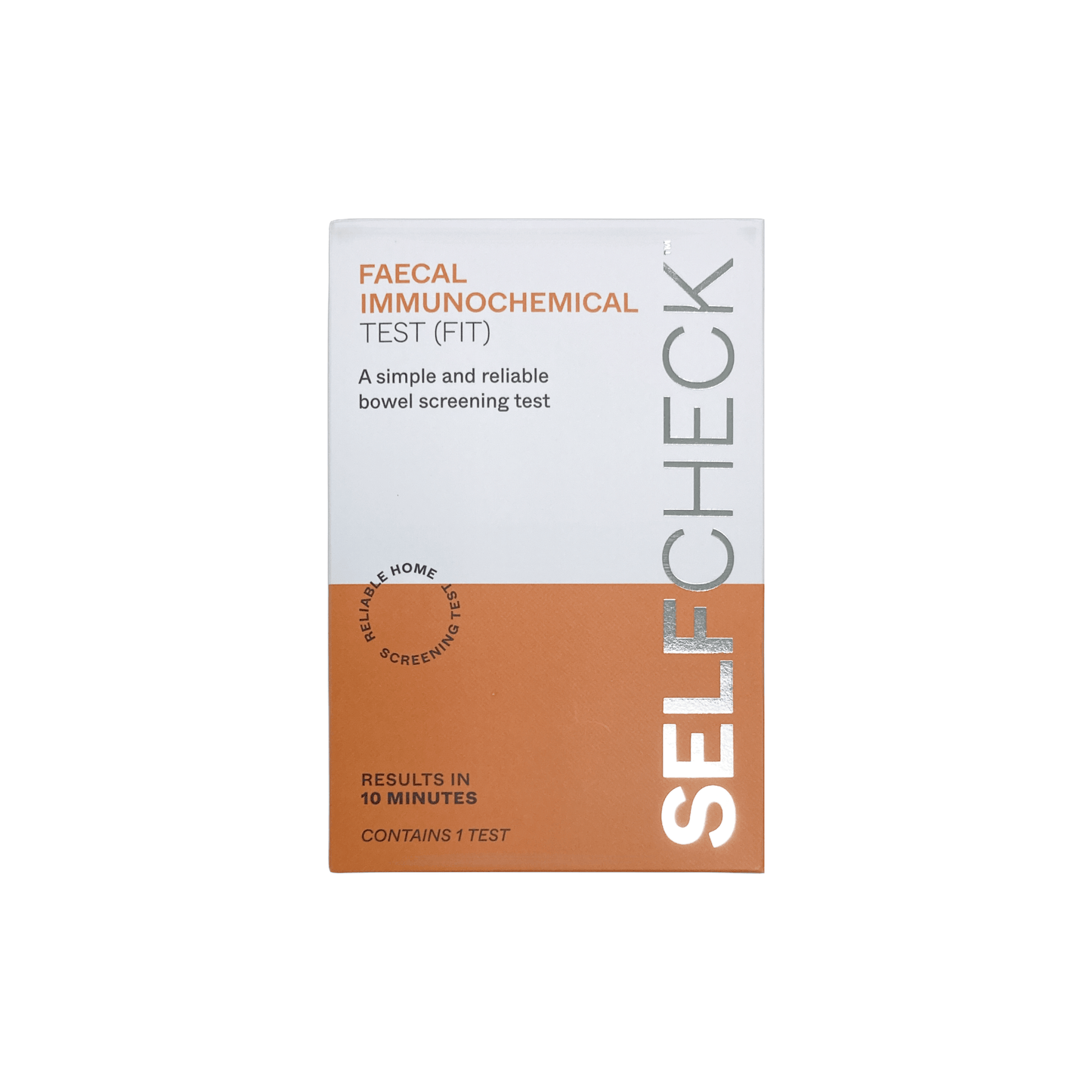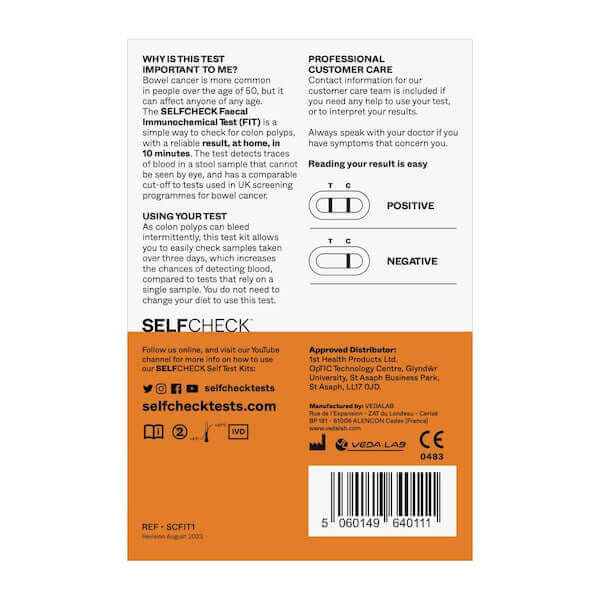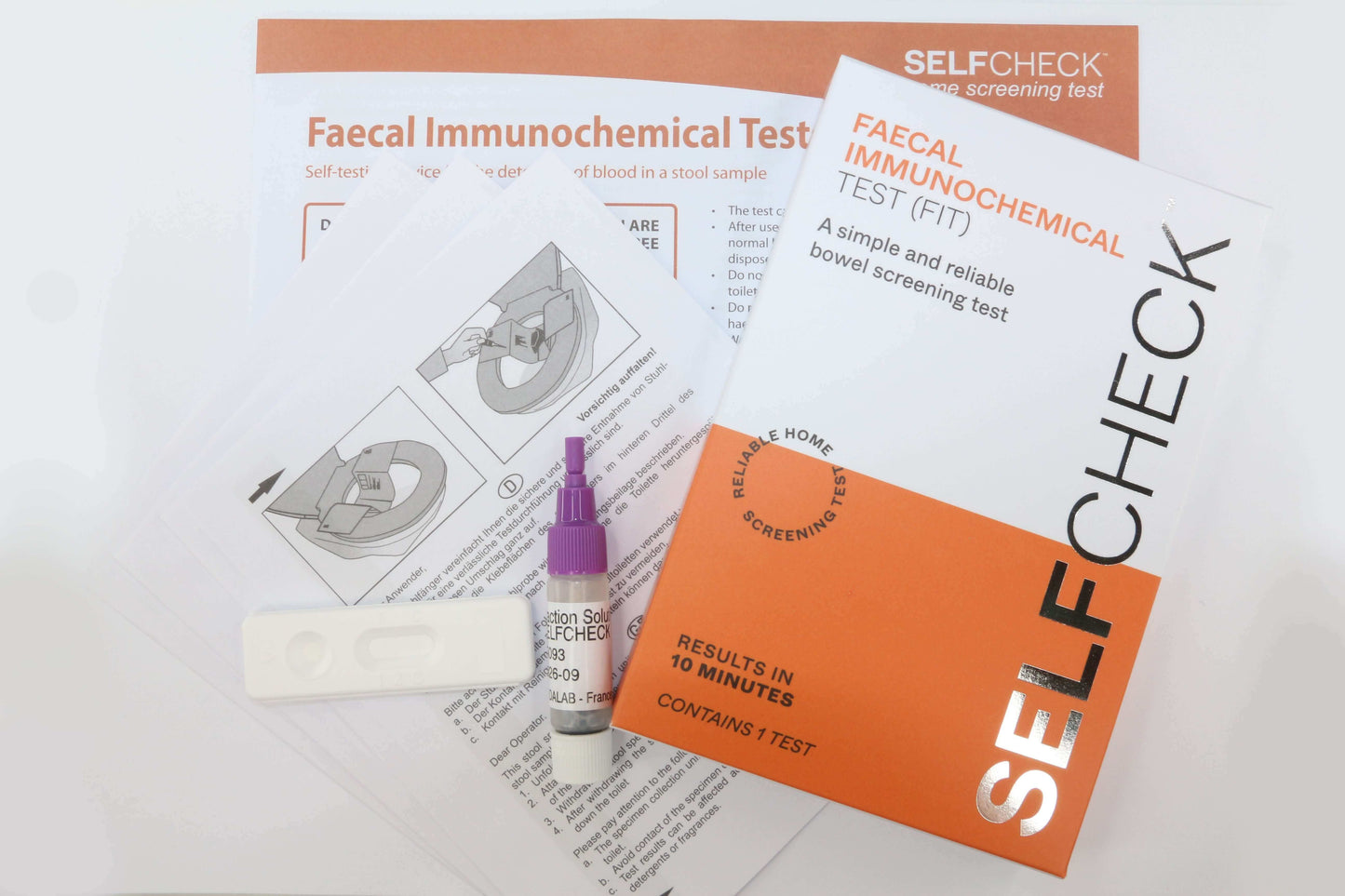SELFCHECK
SELFCHECK Faecal Immunochemical Test (FIT)
SELFCHECK Faecal Immunochemical Test (FIT)
Free UK delivery on orders over £25
Free UK delivery on orders over £25
Order before 2pm Monday to Friday for same day dispatch (except holidays). All orders dispatched in plain packaging.*
Couldn't load pickup availability
The SELFCHECK® Faecal Immunochemical Test (FIT) is a bowel screening test that shows if traces of blood are present in your poo. The test is used at home and gives a result in 10 minutes.
Faecal immunochemical tests are also used in NHS bowel cancer screening programmes, where you collect a poo sample at home and post to an NHS hospital lab for analysis. The NHS screening service is free, and offered to everyone aged 50 to 74 in the UK. A positive FIT result only means that blood has been detected in the sample and is not by itself a diagnosis of bowel cancer.
There are many reasons why blood might be detected in your poo and a positive result will be followed up by your doctor with additional tests to find out why.
If you have symptoms, or are anxious about your health, always speak with your doctor.
How does SELFCHECK compare with the NHS FIT test?
This SELFCHECK test has a detection limit of 40µg Hb/g faeces which is more sensitive than current NHS bowel screening programs, but it is important to keep in mind that the lower the detection limit of a medical test, the greater the chances are of a false positive result, causing unnecessary worry and further investigations. According to Cancer Research UK (7 October 2024), the FIT screening threshold is 80 µg Hb/g in Scotland and Wales, and 120 µg Hb/g in England and Northern Ireland.
There are plans across the UK to reduce the FIT screening threshold in order to detect more bowel cancers early. Your doctor may use a test that is more sensitive than those used for screening if you have symptoms that might be related to bowel cancer.
The SELFCHECK test gave 93% agreement when compared with laboratory tests for the detection of blood in a faecal sample.* Of course, just like any self-testing kit, if you do not follow the procedure as written in the instructions, then you may get a false result.
Simple hygienic sample collection
The SELFCHECK test requires only a tiny amount of stool sample, and uses the faecal immunochemical test method (FIT) to give you an easy-to-read visual result in around 10 minutes at home.
Colon polyps are known to bleed intermittently, which means that testing on one occasion might lead to a false negative result. The SELFCHECK test allows you to collect three samples on three different days, increasing the chances of detecting blood in your stool sample. The test kit contains one test device which is used after the third sample has been collected. Full, easy-to-follow instructions are provided with your test kit.
What a result will tell you?
Screening tests are not meant to be used if you already have symptoms. Speak with your doctor.
If you get a negative result, this means that the amount of blood in the sample at the time of testing was lower than the cut-off. No medical test by itself, whether used at home or in a hospital laboratory, will be 100% accurate. If you have symptoms, then you must still speak with your doctor.
If you get a positive result, this means that the amount of blood detected at the time of testing was higher than the cut-off. You should speak with your doctor, tell them that you got a positive result, and take along the instruction leaflet which has additional information about your test for health care professionals.
What is a faecal immunochemical test (FIT)?
The faecal immunochemical test (FIT) is a type of test used in NHS bowel cancer screening programmes as a reliable way to check for the early stages of bowel cancer. Unlike older faecal occult blood tests (FOB), which rely on a chemical colour change to detect blood in a stool sample and can be prone to false positive results from eating meat, the faecal immunochemical test uses specific monoclonal antibodies to detect only human haemoglobin (Hb). It is important to understand that traces of blood may be present in your poo for reasons other than colon polyps or bowel cancer. The SELFCHECK Faecal Immunochemical Test has a cut-off designed for screening people who do not yet have any symptoms. Always speak to your doctor if you think you have bowel cancer symptoms or can see blood in your poo.
As the test uses the FIT detection method, no change in diet or fasting is required prior to using the test.
You do not need to send a sample away as the test kit contains a test cassette that allows you to check your own poo sample and get a reliable result in 10 minutes.
Further help
If your SELFCHECK FIT result is inconclusive, or you are unsure whether you have used the test correctly, and would like us to check your interpretation of your result, contact details for our UK based self-test experts are included in the instruction leaflet provided with your test.
Contains 1 test.
Information for health care professionals
Principle, performance data, and regulatory information regarding the SELFCHECK Faecal Immunochemical Test (FIT) is available for health care professionals.
*More than 93% agreement with laboratory tests (CI 95% 86.78 to 97.17) refers to the agreement between the SELFCHECK test and hospital laboratory faecal immunochemical tests (FIT), and not to the diagnostic efficiency of FIT for the diagnosis of bowel cancer.
Revision 12th September 2025.
Before you decide to test
Before you decide to test
Before deciding to test, it is important that you understand the limitations of medical tests in general, as well as self-testing kits.
Make sure that you have considered what a result will mean to you before you take a test.
We also want you to be aware that no biomarker, even when checked by your hospital lab, is 100% perfect at diagnosing a specific medical condition. Because of this, a false positive result may cause unnecessary worry and further investigations, whilst a false negative result may give you peace of mind, when actually there may be an underlying condition that requires treatment.
Rather than purchasing a self-test kit, you may therefore wish to speak with your NHS GP first, who can arrange for tests if needed.
What SELFCHECK users say
What SELFCHECK users say
We invited SELFCHECK customers to tell us about their experience with their SELFCHECK test.
- 4/5 overall rating
- 9/10 easy to read instructions
- 4/5 thought that using the test was worthwhile
"All appeared good and instructions easy to follow"
"Everything was easy to follow"
"Very satisfied with your service"
"Simple enough, just had to check the instructions a couple of times"
The survey was completed in the Summer of 2024 of 118 random respondents who purchased one of our SELFCHECK tests. All customers are provided with contact information for our customer care team with their test, if they need any help to use their SELFCHECK test, or help to interpret their results.
For further information on how the scores were calculated please contact SELFCHECK.
Information for doctors
Information for doctors
SELFCHECK has been a leading British brand of health checks for over 10 years.
At SELFCHECK, we're working hard to make self-testing better for your patients. All our medical tests are assembled at our quality assured (ISO13485) medical device facility in the UK, and registered with MHRA according to UK medical device regulations IVDD/IVDR.
We are working closely with the NHS and academia to develop new diagnostics at our own UK R&D labs, particularly in the areas of sepsis, and the monitoring of chronic diseases.
Our professional customer care team provide help for your patients, so they can fully understand how our tests work, and how they should be used.



Important to know
All SELFCHECK branded tests are assembled by us in the UK at our ISO13485 certified manufacturing and R&D facility. Our medical tests are also CE certified according to UK and EU regulations, and registered with MHRA as self-testing devices.
Our tests are based on the same principles used by hospital labs, and provide reliable, meaningful results, but self-testing is not meant to replace established NHS healthcare pathways. Always consider what a positive or negative result will mean to you before testing, and be aware of the limitations of the test you are using.
If you have symptoms that concern you, or are anxious about your health, always speak with your pharmacist or doctor.



